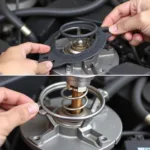Car diagnostic tool repair shops are essential for modern vehicle maintenance. These shops utilize specialized equipment to pinpoint issues, saving time and money. From identifying a check engine light’s cause to complex system diagnostics, these tools are invaluable. This guide explores the critical role of car diagnostic tools in repair shops, examining their types, benefits, and selection process.
Choosing the right car diagnostic tool can be a game-changer for your repair shop. It allows mechanics to quickly and accurately diagnose vehicle problems, leading to efficient repairs and satisfied customers. But with so many options available, finding the best fit for your needs can be challenging. This article will cover everything you need to know about car diagnostic tool repair shops, from understanding the different types of tools to choosing the best one for your business. For those interested in specific tools, check out our review of the autel ap200 bluetooth obd2 scanner car diagnostic tool.
Types of Car Diagnostic Tools for Repair Shops
Car diagnostic tools vary in complexity and functionality, catering to different needs and budgets. Understanding these variations is crucial for making an informed decision.
OBD2 Scanners
OBD2 scanners are the most common type, reading diagnostic trouble codes (DTCs) from a vehicle’s onboard computer. These codes indicate the nature of a problem, allowing mechanics to narrow down the source of the issue.
Advanced Diagnostic Scanners
For more in-depth analysis, advanced diagnostic scanners offer functionalities like live data streaming, bi-directional control, and special functions for specific vehicle makes and models. These tools are essential for diagnosing complex electronic systems.
Oscilloscopes
Oscilloscopes provide a visual representation of electrical signals within a vehicle’s systems. This allows mechanics to identify intermittent faults and analyze signal patterns, which can be crucial for diagnosing intricate electrical problems.
Benefits of Using Car Diagnostic Tools in Repair Shops
The advantages of incorporating car diagnostic tools into a repair shop’s workflow are numerous.
Improved Accuracy and Efficiency
Diagnostic tools eliminate guesswork, enabling faster and more precise diagnoses. This reduces repair times and minimizes the chances of misdiagnosis, ultimately saving time and resources.
Enhanced Customer Satisfaction
Quick and accurate diagnoses lead to faster turnaround times, resulting in increased customer satisfaction. Customers appreciate the transparency and efficiency provided by these tools. If you are in the market for tools to service vehicles, check out our review of used car programming and coding tool.
Increased Profitability
Efficient diagnostics translate to increased profitability for repair shops. By streamlining the repair process, businesses can handle more vehicles and maximize their revenue.
Choosing the Right Car Diagnostic Tool for Your Repair Shop
Selecting the appropriate car diagnostic tool requires careful consideration of several factors.
Budget
Establish a budget before exploring available options. Diagnostic tools range in price from affordable OBD2 scanners to high-end professional systems.
Vehicle Coverage
Consider the types of vehicles your shop typically services. Ensure the chosen tool supports the makes and models you regularly encounter.
Functionality
Evaluate the features offered by each tool. Determine which functionalities are essential for your shop’s needs, such as live data streaming, bi-directional control, and special functions.
## Car Diagnostic Tool Repair Shops: Frequently Asked Questions
Here are some common questions about car diagnostic tools and their use in repair shops.
What is a car diagnostic tool?
A car diagnostic tool is an electronic device used to interface with a vehicle’s onboard computer system to retrieve diagnostic trouble codes (DTCs) and other data that can help identify problems with the vehicle.
Why are car diagnostic tools important for repair shops?
Car diagnostic tools are crucial for modern repair shops because they allow mechanics to quickly and accurately diagnose vehicle problems, saving time and money.
What are the different types of car diagnostic tools?
Common types include OBD2 scanners, advanced diagnostic scanners, and oscilloscopes. Each offers different functionalities and capabilities.
How do I choose the right car diagnostic tool for my shop?
Consider your budget, the types of vehicles you service, and the necessary functionalities when selecting a tool.
What are the benefits of using diagnostic tools?
Benefits include improved accuracy and efficiency, enhanced customer satisfaction, and increased profitability.
Where can I find reliable car diagnostic tools?
Reputable automotive tool suppliers and online retailers offer a wide selection of diagnostic tools.
How do I use a car diagnostic tool?
Most tools come with user manuals or online resources that provide detailed instructions on how to operate them.
Conclusion
Car diagnostic tool repair shops represent the future of automotive maintenance. By embracing these technologies, repair shops can enhance their efficiency, accuracy, and ultimately, their profitability. Choosing the right tools is a crucial investment that can significantly impact a repair shop’s success. Remember to consider factors like budget, vehicle coverage, and functionality when making your decision. For specialized tools, consider a car alignment tool set or the professional car diagnostic tool made in korea auto i700. Properly equipped car diagnostic tool repair shops are better positioned to meet the demands of today’s complex vehicles and provide exceptional service to their customers.
Need help with removing those stubborn clips? Check out our guide on the clip removal tool car.
If you need assistance, feel free to contact us via WhatsApp: +1(641)206-8880, Email: [email protected] or visit us at 910 Cedar Lane, Chicago, IL 60605, USA. Our customer support team is available 24/7 to assist you.

